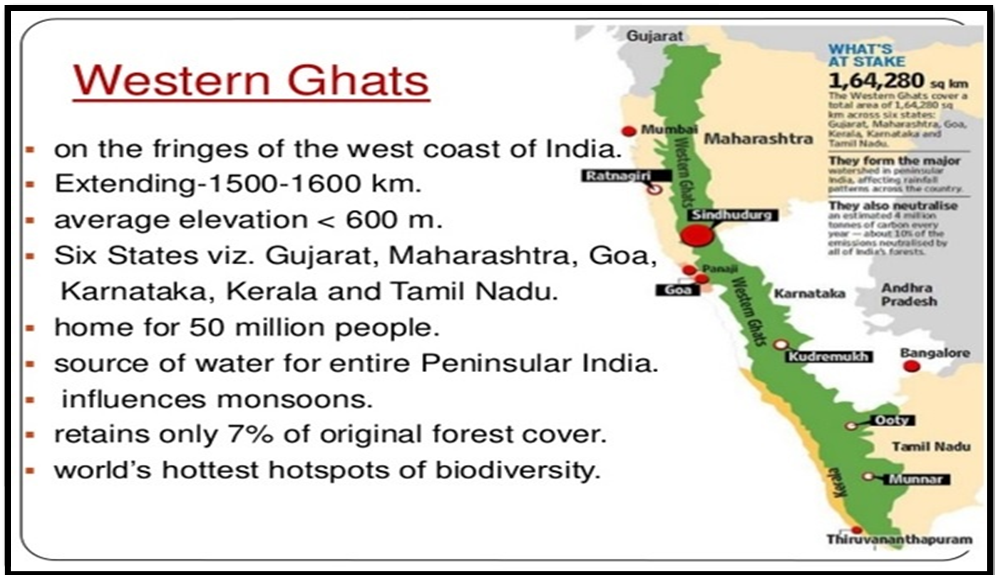A TRIBE IN THE WESTERN GHATS IN NEED OF A LIFELINE
Syllabus :
- GS-II : Welfare Schemes for Vulnerable Sections of the population by the Centre and States and the Performance of these Schemes.
Why in the news?
The Phani Yerava tribe in Karnataka’s Western Ghats faces challenges like addiction, impacting livelihoods and education, necessitating policy attention.
source:springer
About Makuta Village and the Phani Yerava Tribe
Location and Heritage:
- Situated in Karnataka’s Western Ghats, Makuta village lies near the Kerti reserved forest, part of the Talacauvery sub-cluster, a designated World Heritage Site known for its dense tropical evergreen forests.
Tribal Inhabitants:
- Makuta village is home to the Phani Yerava tribe, residing in a Girijan colony. In 2021, with local support, the Yerava households successfully claimed 135 acres of forest land under the Forest Rights Act.
Understanding Western Ghats:Geography:· Mountain Range: The Western Ghats form a continuous chain of mountains running parallel to India’s Western Coast.· States Covered: Spanning across the states of Kerala, Maharashtra, Goa, Gujarat, Tamil Nadu, and Karnataka.Mountain Ranges:· Nilgiri Ranges: Southeast of Mysore, linking Western Ghats to Eastern Ghats via Shevaroys and Tirumala ranges.· Anamudi Peak: Tallest peak in Western Ghats and India outside Himalayas, located in Kerala.Famous Hill Stations:· Popular Destinations: Matheran, Lonavala-Khandala, Mahabaleshwar, Panchgani, Amboli Ghat, Kudremukh, and Kodagu.Rivers:· West Flowing: Rivers like Periyar, Bharathappuzha, Netravati, Sharavathi, Mandovi.· Hydroelectric Potential: Fast-moving, aiding hydroelectricity production due to steep gradients.· East Flowing: Major rivers include Godavari, Krishna, Kaveri, along with tributaries like Tunga, Bhadra, Bhima, Malaprabha, Ghataprabha, Hemavathi, Kabini.Significance:· Climate Influence: The Ghats play a crucial role in shaping the Indian monsoon weather patterns, moderating the warm tropical climate of the region.· Barrier Effect: Acting as a barrier, they intercept rain-laden monsoon winds originating from the southwest, influencing precipitation patterns.· Biodiversity Hotspot: Home to tropical evergreen forests and housing 325 globally threatened species, the Western Ghats are a biodiversity hotspot of immense ecological importance.About Tribal Communities of the Nilgiris Todas:
Soligas:
Halakki Vokkals:
|
Challenges Faced by the Phani Yerava Tribe:
- Dependence on Forest Livelihood Declining: The Phani Yerava tribe, residing in Makuta village near the Kerti reserved forest in Karnataka’s Western Ghats, historically depended on the forest for livelihood.
- Claiming Forest Land: In 2021, the tribe successfully claimed land under the Forest Rights Act, signifying their rights over the forest area they inhabit.
- Reduced Enthusiasm for Forest Rights: Despite acquiring forest rights, the tribe showed limited enthusiasm as their reliance on the forest for livelihood had diminished over time.
- Challenges with Forest Produce Collection: Gathering minor forest produce like dhoopa and shekakai became tiresome, and the returns from selling these items decreased due to market volatility and exploitation by middlemen.
- Shift to Daily Labour: Due to the challenges with forest produce collection, many tribal members shifted to daily labour, primarily in casual or agricultural work, as their main source of income.
- Impact on Education and Livelihood: Alcohol abuse among tribal members, likely influenced by city labourers, has led to adverse effects on livelihoods, education, and community well-being.
Policy Implications and Concerns
- Policy Oversight: Issues like alcohol abuse pose significant threats to the well-being of the Phani Yerava tribe, demanding urgent policy attention and intervention to mitigate their adverse impacts.
- Socio-Economic Impact: The scourge of addiction undermines the socio-economic status and overall quality of life within tribal communities, necessitating proactive measures for their upliftment and welfare.
Challenges / The Scourge of Addiction:
- Widespread Alcohol Abuse: Following the implementation of the Forest Rights Act, a study revealed that nearly the entire Phani Yerava community in Makuta village was intoxicated due to alcohol abuse.
- Impact on Children: Alarmingly, even adolescent children have succumbed to alcohol abuse, resulting in decreased school attendance and hindering their education.
- Isolation from External World: The prevalence of alcohol abuse has led to the community being uninformed about external events and developments, further exacerbating their isolation.
- Disparities in Benefits: Leaders of local tribal communities, including Hasalaru, Gowdalu, and Jenu Kurubas, highlight that only a few numerically dominant tribes among the Scheduled Tribes have been reaping benefits across various aspects of life.
- Need for Government Intervention: Urgent action is required from the government to address these social issues and ensure the well-being of marginalised tribal groups by implementing policies that cater to their specific needs.
- Call for Policy Intervention: Local NGOs, government officials, and tribal leaders advocate for increased attention to social issues like addiction, emphasising the need for inclusive policies to address the marginalised tribal communities’ challenges effectively.
Potential Way Forward:
- De-Addiction Programs: Implement de-addiction drives to address alcohol abuse within the tribe and provide necessary support for rehabilitation.
- Enhanced Livelihood Opportunities: Create sustainable livelihood opportunities for the tribe beyond forest-dependent activities, focusing on skill development and alternative employment options.
- Education and Awareness Campaigns: Conduct awareness campaigns to educate the tribe about the adverse effects of addiction and the importance of education for their children’s future.
- Community Engagement: Involve community leaders and non-governmental organisations in addressing the tribe’s challenges and advocating for their rights and welfare.
- Government Intervention: Prioritise policy initiatives and government interventions to address the socio-economic issues faced by the Phani Yerava tribe, ensuring their inclusion and well-being in developmental agendas.
Conclusion:
By addressing these concerns and implementing inclusive policies, the government can ensure the holistic development and well-being of marginalised tribal communities like the Phani Yerava tribe in Karnataka’s Western Ghats.
Source:
Mains Practice Question:
Discuss the socio-economic impact of alcohol abuse on tribal communities and propose policy interventions to address these challenges effectively.




